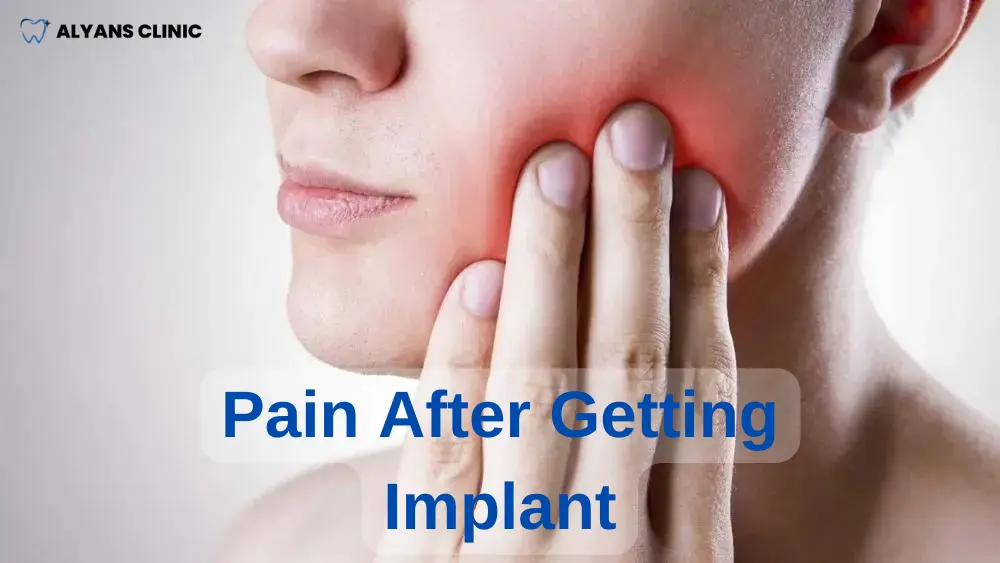
Pain and necessary actions after implant treatment are a natural part of the healing process, and it is important for patients to be aware of these aspects. Post-implant surgery pain is usually minimal, but a careful recovery process is required. During this period, proper pain management and appropriate care measures can ensure a comfortable healing process for patients. In this article, we have addressed what needs to be known to best manage pain and the healing process after implants.
Is There Pain After a Dental Implant?
Yes, mild pain or discomfort can be felt after a dental implant. Since implant surgery involves a surgical procedure on the jawbone and surrounding tissues, it usually causes mild pain. The process of osseointegration, where the implant fuses with the jawbone and the surrounding tissues heal, can take a few days or weeks, during which mild discomfort may be felt.
The pain is usually minimal and can be managed with pain relievers in most cases. Pain and discomfort can generally be reduced with painkillers and care instructions recommended by your dentist.
Why Does an Implant Hurt?
The main reasons for pain in dental implants include:
- Surgical Procedure: The surgical process of placing the implant and the pressure and manipulation on the jawbone can cause mild pain after treatment.
- Healing Process: The healing process of the jawbone and surrounding tissues after implant placement can cause some sensitivity and pain. This includes the osseointegration process where the implant fuses with the jawbone.
- Infection or Complications: Although rare, an infection can develop in the implant area, or problems may arise around the implant. These situations can cause pain and may require treatment. It is important to see your doctor in such cases.
- Gum Problems: Gum issues can occur around the implant. Pain may be present, especially in cases of gum inflammation or recession. In such cases, it may be necessary to seek support from a periodontist.
- Improper Prosthetic Fit: An improperly adjusted or mismatched prosthesis placed on the implant can cause discomfort and pain in the mouth. You should consult your doctor if you experience such discomfort.
What Level of Pain is Considered Normal?
Pain that is mild to moderate in severity is generally considered normal after a dental implant procedure. The intensity of pain can vary depending on the condition of the area where the implant is placed, the complexity of the surgical procedure, and the patient’s pain threshold.
Pain after implant surgery is usually mild to moderate and can often be managed easily with pain relievers. The pain is generally more intense during the first few days and gradually decreases over time. Pain is expected to lessen throughout the healing process. If the pain is very severe or persists for a long time after the implant, it is important to contact your dentist.
What Types of Pain are Not Considered Normal After an Implant?
Certain conditions should be considered in case of any pain or discomfort after implant treatment:
- Severe and Persistent Pain: Severe and unbearable pain after the implant is not considered normal. This could be a sign of complications or infection and should be addressed by a dentist.
- Difficulty Swallowing or Opening the Mouth: Difficulty in opening the mouth or swallowing after the implant procedure may indicate a serious problem in the implant area and may require urgent medical intervention.
- Burning or Sharp Pain: A burning sensation or sharp pain in the implant area may indicate problems or irritation of the tissues around the implant. These conditions should also be evaluated.
- Excessive Swelling or Bruising: Excessive swelling or bruising in the implant area may be concerning for infection or other complications.
- High Fever: A high fever after the implant may indicate the body is fighting an infection and may require urgent medical intervention.
In case of such symptoms or any abnormal conditions, it is recommended to contact your dentist immediately.
What Relieves Pain After an Implant?
Mild pain that may occur after the implant can usually be managed with pain relievers. Using the painkillers recommended by your dentist regularly and applying ice can reduce pain.
Is Swelling Normal After a Dental Implant? How Long Does It Last?
Mild to moderate swelling may occur after implant surgery. This is a natural response to the surgical procedure. Swelling typically peaks within the first 2-3 days and then gradually decreases. Ice packs and anti-inflammatory medications recommended by your dentist can help reduce swelling.
Can There Be Ear Pain After a Dental Implant?
Although the dental implant procedure is generally limited to the jaw area, discomfort may rarely be felt in the ear due to jaw movement or pressure during surgery. However, implant surgery typically does not cause ear pain. It may be necessary to consult a healthcare professional if you experience ear pain or any discomfort.
Can There Be a Headache After an Implant?
Headache after implant surgery is usually not a direct result of the surgical procedure. However, factors such as general anesthesia or stress can cause headaches. In such cases, rest, adequate fluid intake, and pain relievers recommended by your doctor can help alleviate the headache.
Can There Be Mouth Sores After an Implant?
Mouth sores are rare after implant surgery, but in some cases, small cuts or irritations may occur during surgery or the healing process. These sores usually heal over time. Paying attention to oral hygiene will speed up the healing of sores.
How Should Nutrition Be After an Implant?
Nutrition after an implant is important to support the healing process and ensure the successful placement of the implant. Here are some general recommendations regarding nutrition after an implant:
- Soft and Liquid Foods: In the first days after implant surgery, soft and liquid foods should be preferred. Foods such as soups, yogurts, purees, and smoothies can be consumed without straining the implant area.
- Easily Chewable Foods: In the first weeks, foods that do not put pressure on the implant area and are easily chewed and swallowed should be preferred. Boiled vegetables, soft fruits, protein sources like eggs, and soft cheeses may be suitable during this period.
- Avoid Hot and Hard Foods: Hot and hard foods should be avoided for a few days after the implant is placed. Such foods can cause swelling or discomfort in the implant area.
- Avoid Alcohol and Smoking: Alcohol and smoking can negatively affect the healing process and delay recovery. Therefore, it is advisable to avoid these habits if possible.
- Maintain Oral Hygiene: Keeping the implant area clean is very important. Oral care should be done as recommended by your dentist, brushing teeth and using mouthwash without harming the implant area.
- Balanced Diet: A balanced diet rich in vitamins and minerals supports the healing process. Drinking sufficient water can also speed up recovery.
If you’re searching for experienced team to dental implant in Turkey and questioning about dental implant Turkey prices you can contact us.


